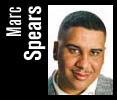 |

|
Updated: May 14, 9:31 AM ET Advice for non-LeBrons: Go to college By Marc J. Spears Special to ESPN.com |
||||||||||||||||||
|
High school basketball stars entering the NBA Draft need to take note: For every Kobe Bryant and Kevin Garnett who went from the prom to the hardwood, there is a Jermaine O'Neal, Jonathan Bender, Al Harrington and DeShawn Stevenson who spent much more time taking notes than making baskets. Monday marks the deadline for early-entry candidates in the June 26 draft. High school phenom LeBron James is projected to be the top pick and will likely start immediately or play major minutes for one of the NBA's worst teams. As for other high school stars who've declared for the draft -- like Starkville (Miss.) High forward Travis Outlaw, Houston Westbury Christian forward Ndubi Ebi, Beaumont (Texas) Ozen center Kendrick Perkins, Birmingham (Ala.) Central Park Christian center James Lang and Blair Academy (N.J.) forward Charlie Villanueva -- an early road to the NBA could mean a lot of hours on the pine, not playing time.
Case in point: The career of DeShawn Stevenson. Stevenson was a first-team Parade All-America pick in 2000 while at Washington Union High in Fresno, Calif. He scored a game-high 25 points in the McDonald's All-America game and won the slam dunk contest. The 6-foot-5, 210-pounder had NBA potential written all over him, but he could have spent a couple of seasons at Kansas first. Instead, Stevenson opted to enter the draft. The Jazz then took the shooting guard with the 23rd overall pick in the 2000 draft, and since then, he has been waiting his turn. Steven has no regrets on turning pro straight out of high school. "I love basketball," he said. "I love playing at the highest level. It was an opportunity to get picked in the first round by a team. I've sacrificed and keep working. That's all I can do." As a rookie during the 2000-01 season, Stevenson averaged 2.2 points and 7.3 minutes in 40 games while playing behind Bryon Russell and John Starks. During the 2001-02 season, Stevenson averaged 4.9 points and 16.9 minutes in 67 contests while playing behind Russell and Starks again. And during the 2002-03 season, Stevenson averaged 4.6 points and 12.5 minutes in 61 contests while playing behind Calbert Cheaney, Matt Harpring and occasionally a backcourt of John Stockton and Mark Jackson. In essence, during his first three seasons, veterans and his inexperience kept Stevenson on the bench. "I don't know. Hopefully, it will come soon," said Stevenson of when his time will come with the Jazz. "You never know. You may be sitting on the bench one day and another day you'll be a starter. Things happen like that in this league. All you got to do is get better and hopefully your time comes ... "I'm almost in my fourth season and only 22. That's crazy. I'm extremely blessed, especially with me being this young. I have a lot of experience (to gain) and a long way to go if I keep doing the things I'm supposed to do." If Stevenson attended Kansas, he could have been a junior on a team that played Syracuse for the national championship this season. He definitely would have been one of the top selections in this year's draft and probably been more developed as a player. Plus his paycheck would have been a lot higher.
With Stevenson's rookie contract having at most two years left on it, he will now have to show improvement in order to garner another nice deal. He definitely has the talent to be a solid NBA player due to his athleticism, strength and developed shooting skills -- and since Cheaney is a free agent, Stevenson probably will have a chance to become a regular starter with the Jazz next season -- but Stevenson has basically had to wait until his fourth season to get a chance to show what he can do. Stevenson says he'll reach his potential "when I get a legitimate chance of playing." "I really can't say right now because I really haven't been given a legitimate chance," he said. "When I do, people can say what they think and I got to rise to the occasion. "It's big to be out there with a good rhythm. It makes a big difference. I would be a way different player (if I was drafted by a bad team). I'd be on the court." By the looks of the 2003 draft, the chance of landing on a team that doesn't need help is likely to happen during the middle and late parts of the first round. The only non-playoff teams selecting from picks 15 through 29 include Atlanta (No. 21) and Memphis (No. 25). And heaven forbid you get drafted in the second round, where you don't get a guaranteed contract let alone a strong chance to prove yourself. Hey teenagers, welcome to the NBA, which is also nicknamed: No Boys Allowed. And it's also a league where other McDonald's All-Americans like Ousmane Cisse, DeAngelo Collins and Korleone Young rolled snake eyes when they attempted to go straight out of high school to the NBA. Good luck just getting on the bench. "In this league, you got to wait for your turn," Stevenson said. "I am doing the things I am supposed to. If I wasn't, I wouldn't be here right now." Marc J. Spears, who covers the NBA and Denver Nuggets for the Denver Post, is a regular contributor to ESPN.com. |
| |||||||||||||||||

